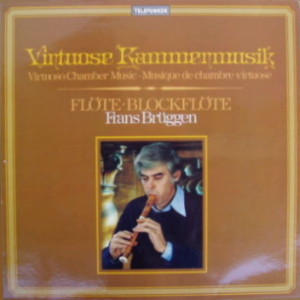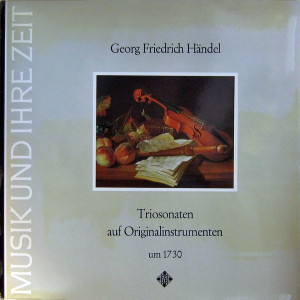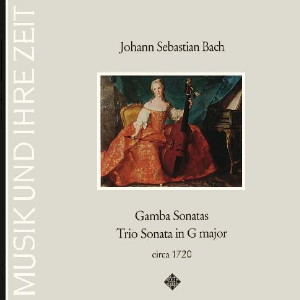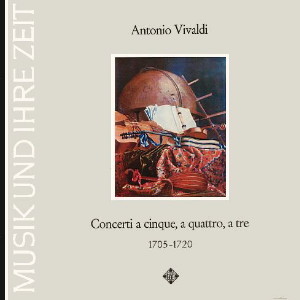 |
1 LP -
Telefunken 6.42330 AP (p) 1978
|
|
| VIRTUOSE KAMMERMUSIK - Flöte
· Blockflöte |
|
|
|
|
|
|
|
| Georg Friedrich
Händel (1685-1759) |
Sonate
h-moll für Traversflöte, Violine
und B.c., Op. 2 Nr. 1b |
|
11' 28" |
A1 |
|
- Andante |
4' 10" |
|
|
|
-
Allegro ma non troppo |
2' 25" |
|
|
|
- Largo |
2' 50" |
|
|
|
- Allegro |
2' 03" |
|
|
|
Sonate
F-dur für Blockflöte in f',
Violine und B.c., Op. 2 Nr. 5 |
|
12' 03" |
A2 |
|
- Larghetto |
2' 32" |
|
|
|
- Allegro |
2' 55" |
|
|
|
- Adagio |
2' 30" |
|
|
|
- Allegro |
1' 58" |
|
|
|
- Allegro |
2' 08" |
|
|
| Johann Sebastian Bach
(1685-1750) |
Sonate
G-dur (Triosonate) für 2
Traverflöten und B.c., BWV
1039 |
|
12' 35" |
B1 |
|
- Adagio |
3' 32" |
|
|
|
- Allegro ma non
presto |
3' 38" |
|
|
|
- Adagio e piano |
2' 25" |
|
|
|
- Presto |
3' 00" |
|
|
| Antonio Vivaldi
(1678-1741) |
Concerto
D-dur für Blockflöte, Violine und
Violoncello, P 198 |
|
10' 08" |
B2 |
|
- Allegro |
3' 53" |
|
|
|
-
|
2' 20" |
|
|
|
- Allegro |
3' 45" |
|
|
|
|
|
|
|
| Frans BRÜGGEN,
Blockflöte, Traverflöte |
Alice Harnoncourt,
Violine (Händel, Vivaldi)
|
|
|
Nikolaus
Harnoncourt,
Violoncello |
|
|
Leopold Stastny,
Traverflöte (Bach)
|
|
|
Herbert Tachezi,
Cembalo (Händel, Bach)
|
|
|
|
|
|
Luogo
e data di registrazione |
|
Vienna
(Austria) - settembre 1969
(Händel)
Vienna (Austria) - marzo 1968
(Bach)
Casino Zögernitz, Vienna (Austria)
- marzo 1968 (Vivaldi)
|
|
|
Registrazione:
live / studio |
|
studio |
|
|
Recording
Supervision
|
|
-
|
|
|
Edizione LP |
|
TELEFUNKEN
- 6.42330 AP - (1 LP - durata 46'
14") - (p) 1978 - Analogico |
|
|
Originale LP
|
|
TELEFUNKEN - SAWT
9559-A - (1 LP - durata 44' 21")
- (p) 1970 - Analogico (Händel)
TELEFUNKEN - SAWT 9536-A - (1 LP
- durata 42' 17") - (p) 1969 -
Analogico (Bach)
TELEFUNKEN - SAWT 9528-A - (1 LP
- durata 42' 47") - (p) 1968 -
Analogico (Vivaldi)
|
|
|
Prima Edizione CD |
|
TELDEC
"Frans
Brüggen
Edition" Vol.
12 -
4509-97474-2 -
(1 CD - durata
68' 46") - (c)
1995 - ADD
(Händel,
Op.2/1b)
TELDEC
"Frans
Brüggen Edition"
Vol. 9 -
4509-97471-2 - (1
CD - durata 63'
40") - (c) 1995 -
ADD (Händel,
Op.2/5)
TELDEC
"Frans
Brüggen Edition" Vol. 11
- 4509-97473-2 - (1 CD -
durata 56' 18") - (c)
1995 - ADD (Bach)
TELDEC
"Frans Brüggen Edition" Vol. 8
- 4509-97470-2 - (1 CD -
durata 63' 29") - (c) 1995 -
ADD (Vivaldi)
|
|
|
Note |
|
-
|
|
|
|
|
   |
Virtuosity
once meant nothing
more than the
inherent integrity
of musical and
technical
accomplishment.
The virtuoso was
plain and simply
the post-creative
artist. However,
as early as in the
17th century this
was already
associated eith
the idea of the
miracle
achievement, the
artistic, and even
of the
sensational. There
is typical
"virtuoso music"
especially created
in order to give
particular
emphasis to
extraordinary
talent, the
so-called "wizard
player". Not
infrequantly such
unusual
personalities
composed for their
own purposes - as
for instance
Niccolò Paganini
or Franz Liszt -
since only in this
way did the utmost
in self-fulfilment
appear to be
guaranteed. While
the composer of
earlier epochs
wrote mainly for
daily
requirements, in
more recent times
a more marked and
differentiated
sense of history
determined the
manner of musical
interpretation.
The music of
baygone epochs has
long since ceased
to be the concern
of historians, but
is increasingly
becoming a firm
integral part of
our musical life.
At the same time
it has become
apparent that the
use of oroginal
instruments by no
means of itself
guarantees
adequate sound
results. For this
purpose an
interpreter is
required who
mediates between
the work and the
sound. Applied to
history, this can
mean a radical
change, namely the
departure from
more recent
music-making
experiences which
often cloud our
view of the
original. Among
the protagonists
of this movement
in our time - at
least in the
sector of flute
music - is the
Dutchman Frans
Brüggen. Where the
expressive
dimensions of the
composition call
for it, this
musician knows how
to apply both the
technique and
sound of the
transverse flute,
and similarly in
the field of
historical music
he realises how
the completely
different tonal
values associated
with the recorder
should be
employed. The
present slection
from the enormous
repertoire of this
musician provides
testimony to the
changeability and
flexibility of the
flute sound. It
goes almost
without saying
that in this
instance close
partnership, i. e.
history-conscious
harmony among the
ensemble members,
is essential.
Music by Handel,
Bach and Vivaldi
is taken here as a
possibility of
shalding off an
emotionality with
which it does not
accord. In this
way an alternative
method results of
letting this music
appear in a
different light
from the
accustomed one.
The stage has long
since been
overcome in which
instrumentally
conditioned
inadequacy was
"cultivated" in
order to arouse a
feeling of greater
authenticity.
Intensive study of
the soyrces and
just as intensive
committed
transformation of
the knowledge thus
gained into sound
open up fresh
perspectives. To
this extent
virtuoso chamber
does not mean only
technically
brilliantly
executed
interpretations,
but also an active
coming to terms
with lost,
erstwhile musical
concepts which
were "taken for
granted". Thus at
the same time new
dimensions appear,
in increasing
ratio to the
degree in which we
become more
acquainted with
the performed
works.
Gerhard
Wienke
(English
translation by
Frederick A.
Bishop)
|
|
|
|

